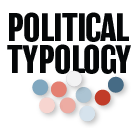Do one’s political leanings blind people to the facts? Judging from decades of polling, the answer is sometimes yes—partisanship appears to lead some people to claim as facts things that aren’t particularly factual.
For example, national surveys have found that Democrats are more likely to say that inflation rose under Ronald Reagan while Republicans say that the deficit rose during the Clinton administration. Some 81% of Democrats but 33% of Republicans in an April 2011 New York Times/CBS News poll said Obama was born in the U.S.
What explains these partisan gaps? Political scientists from Yale University and the University of California-San Diego think they may know. Their working paper released last month by the National Bureau of Economic Research found significant numbers of Democrats and Republicans actually know the correct answer to these questions—or know that they don’t know—but choose to give pollsters the incorrect response in order to cast their party in a favorable light or stick it to the opposition.
In fact, the researchers found that they could cut the partisan gap by more than half if they offered survey respondents a chance at a monetary reward for answering questions correctly. And when they gave respondents incentives to acknowledge that they don’t know the right answer, the partisan knowledge gap nearly disappeared.
In a 2008 national internet survey conducted by the YouGov and Polimetrix research firms, investigators randomly assigned 419 self-described Republicans and Democrats to two groups. Those in the control group were asked 12 knowledge questions, including whether the unemployment and inflation rates had gone up or down under President George W. Bush and factual questions about the wars in Iraq and Afghanistan. As expected, large partisan gaps on nine of the questions were found among respondents in the control group.
The second group was asked the same questions but was told that for every correct answer, their name would be entered into a drawing for a $200 Amazon.com gift certificate. Respondents also were told that the more right answers they got, the better their chances of winning.
Oh, how the prospect of a payoff can sharpen the mind: Among those offered the monetary incentive, the partisan gaps fell on average “by about 55% and 60% across all of the questions for which partisan gaps appear,” the study concluded.
In a second experiment conducted in 2012 with larger samples of Republicans and Democrats, respondents were offered incentives if they gave the right answer and also if they said they did not know. This time the gap was reduced by 80%.
“The experiments show that small payments for correct and ‘don’t know’ responses sharply diminish the gap between Democrats and Republicans in responses to ‘partisan’ factual questions,” the paper concluded. “The results suggest that the apparent differences in factual beliefs between members of different parties may be more illusory than real.”

Political Typology Quiz: How Red or Blue are You? Choose from a series of paired statements to determine where you fit on the political spectrum. Take the quiz.
